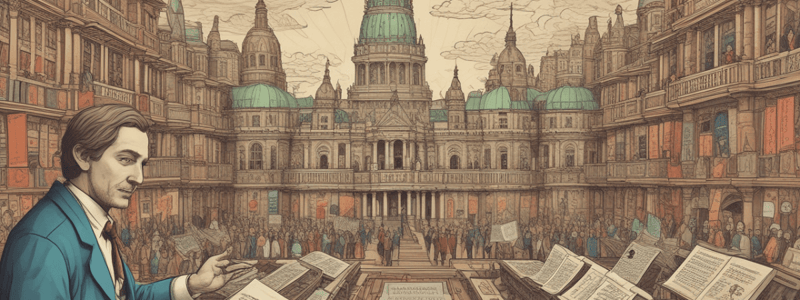Podcast
Questions and Answers
What is the primary consideration for governments and politicians in a democracy?
What is the primary consideration for governments and politicians in a democracy?
- Implementing policies that are best for the country
- Appealing to the electorate to win the next election (correct)
- Comparing outcomes to market alternatives
- Understanding the interests of the private sector
What can result from having distorted views of what democracy can achieve?
What can result from having distorted views of what democracy can achieve?
- Better-designed constitutions
- More effective public choice
- Government overload and disenchantment towards democracy (correct)
- Increased participation in the democratic process
What is the main purpose of studying Public Choice?
What is the main purpose of studying Public Choice?
- To promote the Nirvana Fallacy
- To understand how markets work
- To understand government behavior in democracies and non-democracies (correct)
- To design perfect solutions to social problems
What is the Nirvana Fallacy?
What is the Nirvana Fallacy?
Why do some countries fail to grow economically?
Why do some countries fail to grow economically?
What is the primary goal of governments and politicians in a democratic system?
What is the primary goal of governments and politicians in a democratic system?
What do public choice theorists aim to understand?
What do public choice theorists aim to understand?
What can result from ignoring the realities of how democracy works?
What can result from ignoring the realities of how democracy works?
Why is it important to understand government behavior in both democracies and non-democracies?
Why is it important to understand government behavior in both democracies and non-democracies?
What is the fallacy of rejecting a realistic solution because it doesn’t meet the standard of an imaginary, perfect solution?
What is the fallacy of rejecting a realistic solution because it doesn’t meet the standard of an imaginary, perfect solution?
What is the underlying assumption of public choice theorists when analyzing government behavior?
What is the underlying assumption of public choice theorists when analyzing government behavior?
What is the consequence of ignoring the realities of how democracy works?
What is the consequence of ignoring the realities of how democracy works?
What is the primary benefit of studying public choice in the context of institutional design?
What is the primary benefit of studying public choice in the context of institutional design?
What is the underlying flaw in the Nirvana Fallacy?
What is the underlying flaw in the Nirvana Fallacy?
What is the relationship between democracy and the interests of the electorate according to public choice theory?
What is the relationship between democracy and the interests of the electorate according to public choice theory?
In a democratic system, governments and politicians prioritize implementing policies that appeal to the electorate to win the next election.
In a democratic system, governments and politicians prioritize implementing policies that appeal to the electorate to win the next election.
Public choice theorists analyze government behavior based on what policy would be best.
Public choice theorists analyze government behavior based on what policy would be best.
The Nirvana Fallacy is accepting a realistic solution because it meets the standard of an imaginary, perfect solution.
The Nirvana Fallacy is accepting a realistic solution because it meets the standard of an imaginary, perfect solution.
The primary goal of governments and politicians in a democratic system is to serve the public interest.
The primary goal of governments and politicians in a democratic system is to serve the public interest.
Democracy is the best system available, but it can still have its limitations and imperfections.
Democracy is the best system available, but it can still have its limitations and imperfections.
In a democratic system, governments and politicians prioritize implementing policies that benefit the overall public interest.
In a democratic system, governments and politicians prioritize implementing policies that benefit the overall public interest.
The Nirvana Fallacy involves accepting a realistic solution because it meets the standard of an imaginary, perfect solution.
The Nirvana Fallacy involves accepting a realistic solution because it meets the standard of an imaginary, perfect solution.
Public choice theorists aim to understand what policy would be best for a given situation.
Public choice theorists aim to understand what policy would be best for a given situation.
Democracy is a system that can achieve perfect outcomes.
Democracy is a system that can achieve perfect outcomes.
Studying public choice helps in understanding government behavior only in democracies.
Studying public choice helps in understanding government behavior only in democracies.
The Nirvana Fallacy involves accepting a realistic solution because it meets the standard of an imaginary, perfect solution.
The Nirvana Fallacy involves accepting a realistic solution because it meets the standard of an imaginary, perfect solution.
Public choice theorists analyze government behavior based on what policy would be best for a given situation.
Public choice theorists analyze government behavior based on what policy would be best for a given situation.
Democracy is a system that can achieve perfect outcomes.
Democracy is a system that can achieve perfect outcomes.
Studying public choice helps in understanding government behavior only in democracies.
Studying public choice helps in understanding government behavior only in democracies.
The primary goal of governments and politicians in a democratic system is to serve the public interest.
The primary goal of governments and politicians in a democratic system is to serve the public interest.
What is the main concern of politicians in a democratic system?
What is the main concern of politicians in a democratic system?
How does the Nirvana Fallacy relate to decision-making in public policy?
How does the Nirvana Fallacy relate to decision-making in public policy?
What is a potential consequence of distorted views of what democracy can achieve?
What is a potential consequence of distorted views of what democracy can achieve?
Why is it important to consider the interests of different parties involved in policy-making?
Why is it important to consider the interests of different parties involved in policy-making?
What is the primary goal of studying Public Choice in the context of institutional design?
What is the primary goal of studying Public Choice in the context of institutional design?
What is the primary consideration for governments and politicians in a democratic system when implementing policies?
What is the primary consideration for governments and politicians in a democratic system when implementing policies?
What is the Nirvana Fallacy and how does it relate to decision-making in public policy?
What is the Nirvana Fallacy and how does it relate to decision-making in public policy?
What is the significance of studying public choice in the context of institutional design?
What is the significance of studying public choice in the context of institutional design?
How does the process of public choice theory contrast with traditional views of democracy?
How does the process of public choice theory contrast with traditional views of democracy?
What is the relationship between democracy and the interests of the electorate according to public choice theory?
What is the relationship between democracy and the interests of the electorate according to public choice theory?
In democratic systems, what drives governments and politicians to implement policies, and what are the implications of this dynamic?
In democratic systems, what drives governments and politicians to implement policies, and what are the implications of this dynamic?
How do public choice theorists approach policy analysis, and what are the benefits of this approach?
How do public choice theorists approach policy analysis, and what are the benefits of this approach?
What is the Nirvana Fallacy, and how does it relate to decision-making in public policy?
What is the Nirvana Fallacy, and how does it relate to decision-making in public policy?
Why is it important to understand government behavior in both democracies and non-democracies, and what are the benefits of studying public choice?
Why is it important to understand government behavior in both democracies and non-democracies, and what are the benefits of studying public choice?
What are the consequences of ignoring the realities of how democracy works, and how can this lead to disillusionment with the system?
What are the consequences of ignoring the realities of how democracy works, and how can this lead to disillusionment with the system?
Flashcards are hidden until you start studying
Study Notes
Public Choice Theory
- Defined as the application of economic methods to the study of political processes
- Also known as "Politics without Romance"
- The Calculus of Consent: Logical Foundations of Constitutional Democracy (1962) by James M. Buchanan and Gordon Tullock is a classic work in this field
- Presents the basic principles of public choice theory
Key Principles
- Compares outcomes of market decisions to outcomes of political decisions
- Questions the assumption that government is the automatic response to problems
- Asks what policy is likely to emerge from real-world dynamics, rather than what policy would be best
- Takes into account the different interests of parties involved
The Nirvana Fallacy
- Rejecting a realistic solution because it doesn’t meet the standard of an imaginary, perfect solution
- Example: seat belts could trap a person in a fire, therefore seatbelts shouldn’t be worn (fallacy: seatbelts save lives on average)
- No solution is perfect
Government Behavior
- Governments and politicians are elected to implement policies that appeal to the electorate
- They must consider the interests of different parties involved
- Democracy is the best system available, but distorted views of what it can achieve may lead to false expectations
- This can lead to disenchantment towards democracy itself and government overload
Rational Ignorance
- Exists when the benefits of being informed are less than the costs of being informed
- Important for three reasons:
- Ignorance makes it difficult to make informed choices
- Ignorance can lead to bad policy
- Not everyone is rationally ignorant
Special Interests
- Have a big stake in government and take a big interest in it
- When they give contributions, politicians know it
- Each member of the public may lose only a little bit, but the special interest gets what it wants, so the public doesn’t pay attention
- The more concentrated the benefit, and the more diffuse the cost
Why Study Public Choice?
- Understand government behavior in democracies and non-democracies
- Better understand the consequences of government behavior
- Why do some countries fail to grow?
- Better design constitutions
- Avoid the Nirvana Fallacy### The Nirvana Fallacy
- Economists often commit the Nirvana fallacy by comparing an imperfect market solution to a perfectly working government solution (the benevolent dictator assumption)
- Public choice is the rebuttal to the Nirvana fallacy, comparing realistic market with realistic government
- Public choice is a theory of government failure to complement theory of market failure
Public Choice Theory
- The application of economic methods to the study of political processes («Politics without Romance»)
- Presented in "The Calculus of Consent: Logical Foundations of Constitutional Democracy" by James M. Buchanan and Gordon Tullock (1962)
- Compares outcomes of market decisions to outcomes of political decisions
Collective Action and Government Behavior
- Governments and politicians are elected, therefore they have to implement policies that appeal to the electorate to win the next election
- Public choice theorists do not ask what policy would be best, but rather: what policy is likely to emerge from real-world dynamics?
- Different interests of parties involved must be taken into account
- How does democracy work, and how to make it better?
Importance of Public Choice
- Understand government behavior in democracies and non-democracies
- Better understand the consequences of government behavior
- Why do some countries fail to grow?
- Better design constitutions
- Avoid the Nirvana Fallacy
Rational Ignorance
- Exists when benefits of being informed are less than the costs of being informed
- Importance in three areas:
- Makes it difficult to make informed choices
- Can lead to bad policy
- Not everyone is rationally ignorant
Studying That Suits You
Use AI to generate personalized quizzes and flashcards to suit your learning preferences.




